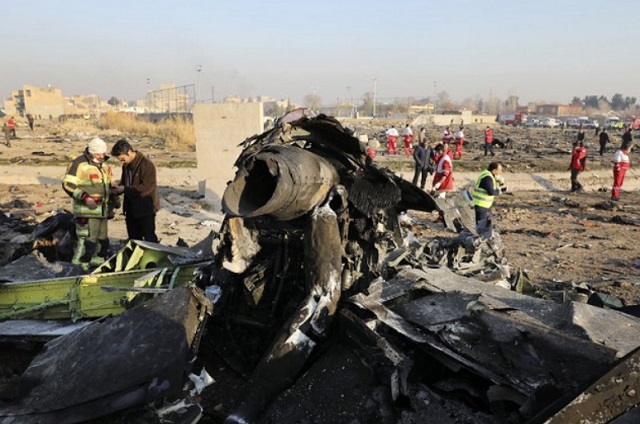
America’s war with Iran
Baca Juga

Many think it is now more likely as Republicans rally behind Trump’s killing of top Iranian general
| THE INDEPENDENT | Republicans of all stripes are standing solidly in support of President Donald Trump’s decision to kill a top Iranian general—even though some believe it makes war more likely.
Conversations with influential conservative figures in recent days, buttressed by exclusive polling data taken before Iranian missile attack in Iraq on Jan.07, indicate that many in Trump’s base see the airstrike on Qassem Soleimani as a necessary move against Iran’s Islamist regime. Soleimani was the mastermind behind numerous attacks on American troops and others in Iraq and beyond.
Many in the Republican cognoscenti compared his killing to former President Barack Obama’s decision to take out Al Qaeda chief Osama bin Laden. While a handful of Trump allies— notably Fox News host Tucker Carlson and Kentucky Sen. Rand Paul—have criticised the Soleimani strike, others are justifying it on grounds that it is a limited move. That’s a key point given Trump’s past promises to disentangle the U.S. from Middle East wars.
Support for the strike extends across various GOP factions: Some 85 percent of Republican voters backed the decision to kill Soleimani, according to a POLITICO/Morning Consult survey. At the same time, overall support for the strike is tepid, with nearly seven-in-10 voters saying it makes war with Tehran’s Islamist regime more likely, including 58 percent of Republicans.
“I think people are genuinely greatly pleased that the president has taken action against this monster who has killed probably over 700 Americans directly,” said former Arkansas Gov. Mike Huckabee. “Why anybody would think this is less-than-stellar is beyond me.”
Trump administration officials have said the decision to kill Soleimani, who was targeted by a U.S. Reaper drone while visiting Baghdad, came amid indications that he was plotting new attacks on Americans. It also followed a series of strikes by Iranian-backed militias in Iraq against U.S. troops based there, including one that killed an American contractor.
Iran’s cleric-led government has vowed revenge over the killing of Soleimani, who by some estimations was second in power only to the country’s Supreme Leader Ayatollah Ali Khamenei. The Iranian regime has held massive processions in Soleimani’s honor in an attempt to show the depth of anger over his death at U.S. hands. And on Jan.07, Iran retaliated by sending a barrage of missiles at U.S. installations in Iraq, though early reports suggested no Americans were killed.
The attack on Soleimani was a stunning escalation in the spiraling showdown between Tehran and Washington. That feud has ramped up since Trump took office, left the Iran nuclear deal and began re-imposing economic sanctions targeting the Iranian government.
In many ways, Iran has been a singular focus of ire for Trump and his aides. It’s a favorite rhetorical target of Secretary of State Mike Pompeo, who often makes sure to refer to Iran by its full name: “the Islamic Republic of Iran.”
But the administration’s sanctions-heavy “maximum pressure” campaign against Iran—which also involves beefing up the U.S. troop presence in the Middle East—has led some Trump supporters to fear that the president will go against past pledges to avoid ground wars in that region.
Fox News’ Carlson has become the de facto leader of anti-interventionist Republicans in the Trump era. “America appears to be lumbering toward a new Middle East war,” he said in response to the attack on Soleimani, and has continued to highlight the potential pitfalls of a confrontation.
But with other anti-interventionist elements of Trump’s base, the killing of Soleimani has been more popular than missile strikes Trump ordered against Syria in 2017 and 2018. Those strikes provoked criticism from several prominent pro-Trump media figures and activists.
“Sad warmongers hijacking our nation,” tweeted radio host Michael Savage about a U.S.-led April 2018 strikes against Syrian government targets in response to a suspected chemical weapons attack near Damascus.
In stark contrast, Savage greeted this month’s strike against Soleimani with jubilation, calling it a “win for free people.”
Right-wing social media agitator Mike Cernovich, an influential figure in pro-Trump online circles, critized the Syria attacks, calling the president “Donald Bush” in response to the 2018 strikes, an unflattering comparison to George W. Bush’s ill-fated Iraq invasion.
But the Solemaini strike does not worry him, he said in an interview: “I don’t know that I’m for it, but I’m certainly not against it, and I’m not freaking out.”
Cernovich said that he, and many other Trump supporters, viewed the Syria strikes as meddling in a civil war, and that he believed they could draw the U.S. further into a quagmire. “I knew this would escalate immediately if there wasn’t pushback from the base,” he said.
He, like other well-known Trump supporters, views the Soleimani killing as a justified retaliation for the deaths of Americans. Cernovich said he would vocally oppose further escalation.
The post America’s war with Iran appeared first on The Independent Uganda:.

0 Response to "America’s war with Iran"
Post a Comment